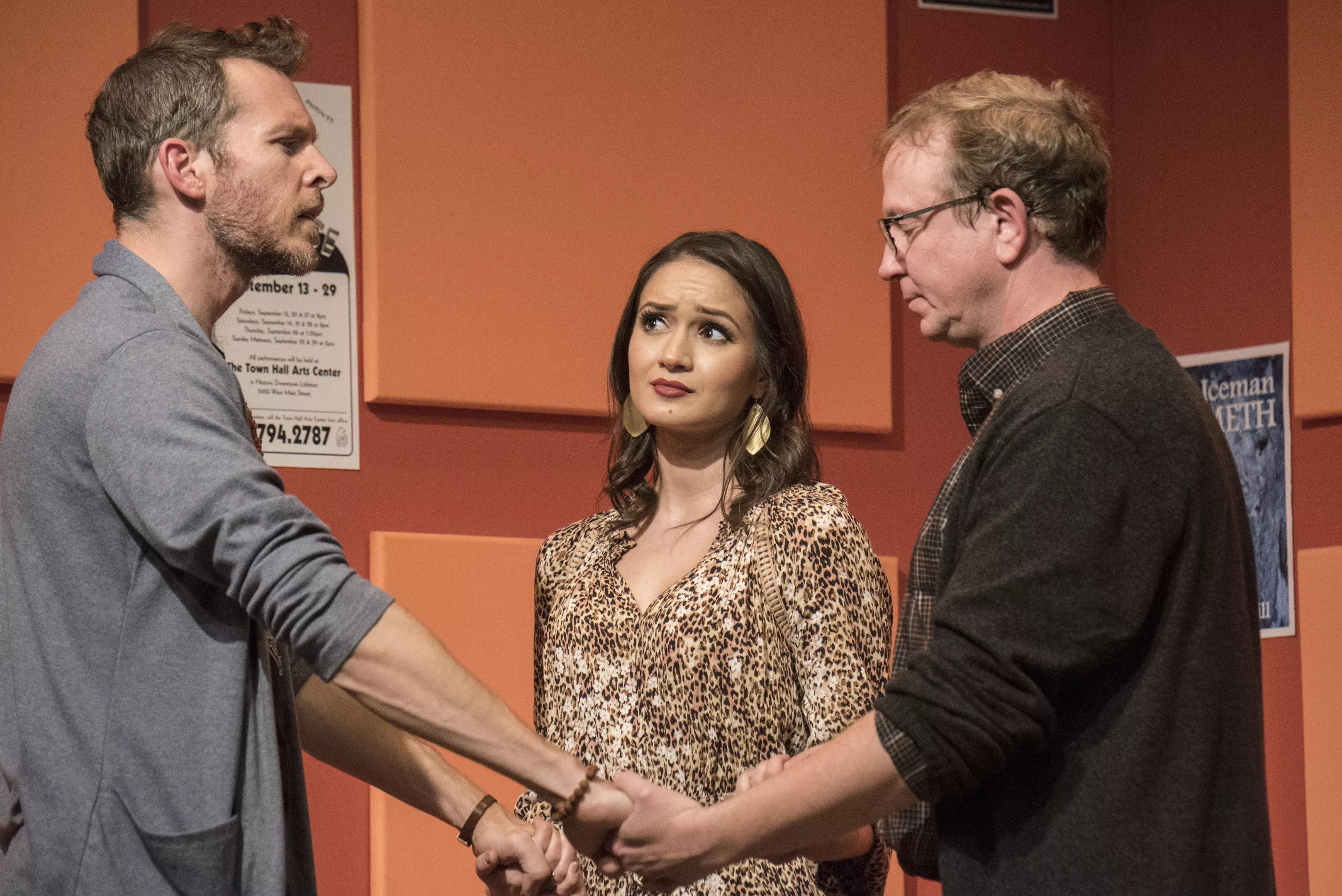
Michael Ensminger

Audio By Carbonatix
In Larissa FastHorse’s Thanksgiving Play, four white characters come together to create a play for elementary school children. Director Logan, a teacher whose job is on the line after 300 parents objected to her production of The Iceman Cometh, is determined to do everything right, to be politically sensitive, to encourage her actors’ input. She has hired a Native American actor from Los Angeles to raise the level of professionalism – much to the ire of Jaxton, a street performer and yoga practitioner who considers himself entirely professional – and also to provide authenticity and advice.
Unfortunately this actor, Alicia, isn’t actually Native American, though she’s been promoted by her agent as that, along with a handful of other ethnicities. Alicia doesn’t see any problem, though. She doesn’t believe in identity casting and, having understudied Jasmine in Disney’s Aladdin, finds herself fully qualified. Is Lumiere in Beauty and the Beast an actual candlestick? she inquires indignantly. The fourth member of this group is Caden, a history teacher who’s always wanted to be a writer and who arrives holding a sheaf of scenes that he feels are entirely authentic and in which the action begins centuries ago.
FastHorse has explained that this play, now receiving a regional premiere with Curious Theatre Company, arose in part from her frustration at having scripts rejected by directors who said they couldn’t find Native American actors for the necessary parts. So here’s a Thanksgiving show that debunks the sanitized verison of the holiday most Americans grew up with and at least alludes to the real suffering of Native Americans without a single Native American participant. Between scenes there are vignettes of actual elementary school songs and activities, all of them predictably ridiculous, blind and/or racist. In a way, having an all-white company works well, emphasizing the absence of Native American voices and experiences from the country’s dominant culture, and the attempt to obliterate a racist, colonial and genocidal history.
Logan and Jaxton are sensitive to the issues – woke, as they might pride themselves on being. Logan desperately wants to avoid offending anyone: the children, their parents, the board or administration, the theatrical precepts she believes in and, of course, any person of color. Jaxton is the kind of guy who flagellates himself for being white, male, heterosexual and privileged so frequently that you can’t help noting that no matter how strongly he’s protesting social wrongs, his focus is always on himself. When he and Logan get into an argument, he encourages her to lacerate his feelings, which she does with vigor. Later he tells Caden that he can’t be hurt by Logan’s comments because they arise from centuries of female oppression. Which means a woman standing in front of him exists more as a symbol than a human being.
All of this is relevant and often very funny. It reminded me of dozens of conversations I’ve had lately about race, sex and gender: Elizabeth Warren’s calling herself part Native American, for instance, and the fact that biologically, race doesn’t exist but is socially constructed. Like sex, which is fluid, variable and to be defined solely by the person possessing it. Themself.
There’s a lot to enjoy here, particularly given Dee Covington’s deft direction and the talent of her actors: John Jurcheck’s wonderfully annoying Jaxton; Emily Ebertz who portrays every harassed, anxious, insecure elementary school teacher you’ve ever met; and Matthew Schneck’s egotistical, fact-bound yet ignorant Caden. Then there’s Adriane Leigh Robinson playing Alicia. Robinson is graceful and stunningly beautiful, with an amazing singing voice. Alicia’s meant to be a scene stealer, and Robinson steals with gorgeous élan.
I thoroughly enjoyed the evening. But I also have to note that the play goes on too long and the jokes get repetitive. Perhaps Caden’s interest in history could unearth a bit more of the historical reality, sharpening and varying the satire. I laughed a lot while watching, but riding home in the car later, I couldn’t come up with a single moment to relish or ponder. Turns out, there’s simply not a lot of there there.
Thanksgiving Play, presented through December 15 by Curious Theatre Company, 1080 Acoma Street; for tickets, go to the Curious Theatre website.